Regensburg Area Studies Prize: Master | Staatsexamen | LL.M.
Promoting Area Studies Research and Teaching in Regensburg
Call for Entries open: aplly by 31 December each year! Jetzt bewerben – Frist jedes Jahr am 31. Dezember !
Ausschreibung: Deutsch | Call for Entries: English | Flyer DE | Flyer EN
The call for graduates from 2024 and 2025 is now open! Apply by 31 December 2025!
Winners of the fifth edition announced | Bekanntgabe der Preisträgerinnen der 5. Edition –read more about them below
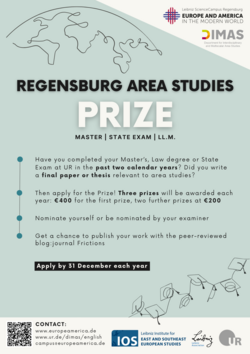 The Leibniz ScienceCampus Europe and America together with DIMAS offers a Prize for Outstanding Master's Theses in Area Studies at the University of Regensburg. The prize was inaugurated in 2000, then in partnership with CITAS, to promote the development of research and teaching with relevance to area studies in the fields of social sciences, humanities, cultural studies, law and economics.
The Leibniz ScienceCampus Europe and America together with DIMAS offers a Prize for Outstanding Master's Theses in Area Studies at the University of Regensburg. The prize was inaugurated in 2000, then in partnership with CITAS, to promote the development of research and teaching with relevance to area studies in the fields of social sciences, humanities, cultural studies, law and economics.
Area Studies explores culture, language, politics, history, and environmental issues, as well as economic, social and legal systems and practices, in both various large-scale regions of the world and smaller-scale regions. The interdisciplinary and multidisciplinary approaches employed in the field can be applied to the study of a single area or used to produce comparisons between spaces. North America, Latin America, and Eastern, Southeastern, Western and Southern Europe, as well as the relations between these regions, form the focus of area studies research and teaching at the University of Regensburg. We particularly encourage applications from students who have explored relations, transfers, entanglements and interconnections between different regions.
The prize recognizes students’ outstanding academic achievements, while also promoting area studies as a focus of research and teaching at the University of Regensburg. The prizewinners will receive a certificate and the prize money. Up to three prizes (a first prize of 400 €, two equal second prizes of 200 € each) will be awarded for final papers and theses submitted as part of master’s degrees, degrees in law or teaching degrees (Masterarbeiten, Zulassungsarbeiten or Studienarbeiten; BA theses will not be considered). As well as prize money, the winners also have the chance to publish in the Blog-Journal Frictions. Two winners of the prize in the inaugural edition, Jana Stöxen and Melanie Hussinger, have published aspects of their master’s thesis in contributions to the blog. More details on the previous winners of the Regensburg Area Studies Prize can be found below.
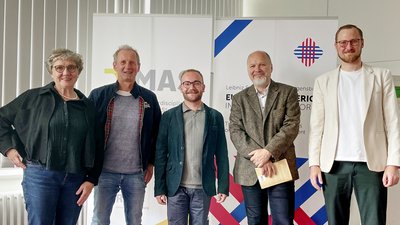 Applications are welcome from any students who completed a teaching, law or master’s degree in relevant programs based in the Faculties of Law, Economics, Catholic Theology, Human Sciences (formerly PPS), Philosophy, Art History, History, and Humanities (PKGG), and Languages, Literature, and Cultures (SLK) in the previous two years. Students can nominate themselves for the prize or be nominated by their thesis supervisor(s).
Applications are welcome from any students who completed a teaching, law or master’s degree in relevant programs based in the Faculties of Law, Economics, Catholic Theology, Human Sciences (formerly PPS), Philosophy, Art History, History, and Humanities (PKGG), and Languages, Literature, and Cultures (SLK) in the previous two years. Students can nominate themselves for the prize or be nominated by their thesis supervisor(s).
The annual deadline for applications is 31 December. Applications are welcome from graduates who completed their master's theses, or equivalent, and graduated in the past two calendar years.The call for graduates from 2024 and 2025 is now open!
Photo by Dr Tanja Wagensohn (UR). Felix Bruckner (centre) with his supervisors Prof. Dr Jörg Skriebeleit to the left and Prof. Dr Marek Nekula to the right. On the very right, Tizian Dick, winner of one of the second prizes. On the left, Natali Stegmann, co-supervisor of Miriam Mähner, winner of the other second prize in the fourth edition (she was unable to attend in person).
 Eine deutsche Übersetzung dieses Textes finden Sie unten.Schauen Sie sich Kurzvideos von den Preisträgerinnen an | Watch short video profiles of the prize winners
Eine deutsche Übersetzung dieses Textes finden Sie unten.Schauen Sie sich Kurzvideos von den Preisträgerinnen an | Watch short video profiles of the prize winners
The winners of the fifth edition of the prize will be presented on 23 April 2025 in a ceremony forming part of the ScienceCampus conference.
The first prize of 400 EUR goes to Marie-Christin Dotzler (image left) who graduated with an MA in Mehrsprachigkeit und Regionalität (Multilingualism and Regionalism) in 2024. In her master’s thesis, titled Migrationsbedingte Mehrsprachigkeit im rätoromanischen Sprachgebiet: eine Analyse ausgewählter Sprachbiografien von Erwachsenen mit Zuwanderungsgeschichte (Migration-related multilingualism in the Rhaeto-Romanic language area: An analysis of selected language biographies of adults with a migration background) she examined how migrants in the Swiss canton of Graubünden deal with local bilingualism and how they simultaneously use their own heritage languages in everyday life. In Graubünden, the Romansh language remains very much alive in some communities and, alongside German, is used as a language of instruction in schools. The considerable number of migrants – many of whom work in construction, hospitality, and gastronomy – navigate this multilingual environment. In her study, she interviewed nine adult individuals from different countries and with various heritage languages, gaining insights into the participants’ language learning strategies and attitudes, their everyday language practices, and the integrative and identity-related dimensions of language and language competence. She was supervised by Prof. Matthias Grünert (Universität Freiburg, Switzerland) and Prof. Rupert Hochholzer (UR). In his review, Prof. Grünert emphasised the exceptional depth of the study and analysis, tracing multilingualism in an oft-overlooked context.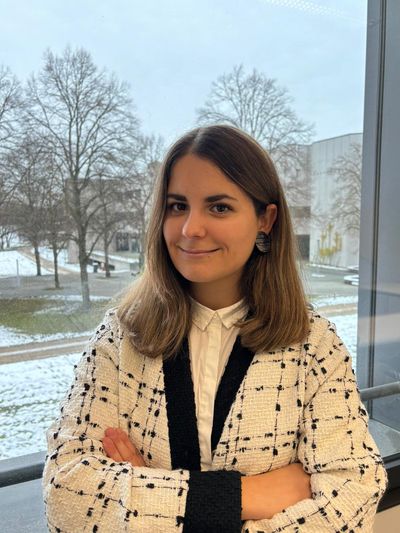
The two second prizes went to Ivana Dinić and Lisa-Marie Holmer. As part of her MA in European Studies, completed in 2024, Ivana Dinić (image right) wrote a thesis titled On Castles and Elephants in the Room: Doing empowerment in a peacebuilding initiative for young women from Kosovo and Serbia supervised by Prof. Ger Duijzings and Dr Sabine Rutar (IOS). She explored the topic of women's empowerment in post-conflict societies, where building cross-ethnic alliances between women proves to be particularly complex as part of international peacebuilding in the Western Balkans. Noting how such initiatives often bracket out political, ethnic, and other potential differences, she argues that individualistic and economic forms of empowerment can hinder collective, cross-ethnic effort to challenge the patriarchal status quo. Through her interviews and research, she not only uncovered problems with such initiatives but also hopes to inspired change in the way peacebuilding efforts are conducted and might in future promote feminism in the Western Balkans. Her supervisors emphasised the impressive analysis and theoretical framework, stressing the policy relevance of her work that combines original empirical studies with critical readings of the findings of existing studies.
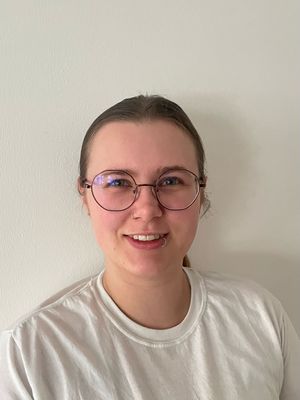 Lisa-Marie Holmer wrote her thesis for the state examination in advanced secondary school teaching in English on the topic of The Influence of American Identity Narratives on the Representation of Indigenous Women in Pocahontas and Lilo & Stitch. In her work, she examined how the portrayal of Americanness in the animated films Pocahontas (1995) and Lilo & Stitch (2002) shapes the portrayal of Indigenous women. She argues that Pocahontas reproduces the ‘melting pot’ narrative, reducing Indigenous identity to stereotypes. Lilo & Stitch, meanwhile, pursed an inclusive approach to American identity, emphasizing cultural pluralism and individuality, while portraying genuine issues faced by the Indigenous population in Hawaii. Prof. Volker Depkat (UR) supervised the study, praising it for its in-depth analysis that traces the continuities and changes in the depictions of Indigenous women, combining precise film analysis with historical contextualisation.
Lisa-Marie Holmer wrote her thesis for the state examination in advanced secondary school teaching in English on the topic of The Influence of American Identity Narratives on the Representation of Indigenous Women in Pocahontas and Lilo & Stitch. In her work, she examined how the portrayal of Americanness in the animated films Pocahontas (1995) and Lilo & Stitch (2002) shapes the portrayal of Indigenous women. She argues that Pocahontas reproduces the ‘melting pot’ narrative, reducing Indigenous identity to stereotypes. Lilo & Stitch, meanwhile, pursed an inclusive approach to American identity, emphasizing cultural pluralism and individuality, while portraying genuine issues faced by the Indigenous population in Hawaii. Prof. Volker Depkat (UR) supervised the study, praising it for its in-depth analysis that traces the continuities and changes in the depictions of Indigenous women, combining precise film analysis with historical contextualisation.
Die Gewinner der fünften Ausgabe des Preises werden am 23. April 2025 während der ScienceCampus Conference bekannt gegeben.
Der erste Preis von 400 EUR ging an Marie-Christin Dotzler, die ihren Master in Mehrsprachigkeit und Regionalität 2024 abgeschlossen hat. In ihrer Masterarbeit mit dem Titel „Migrationsbedingte Mehrsprachigkeit im rätoromanischen Sprachgebiet: eine Analyse ausgewählter Sprachbiografien von Erwachsenen mit Zuwanderungsgeschichte“ untersuchte sie, wie Migrant:innen im Schweizer Kanton Graubünden mit der Zweisprachigkeit vor Ort umgehen und wie sie gleichzeitig ihre eigenen Herkunftssprachen im Alltag gebrauchen. In Graubünden ist die rätoromanische Sprache in einigen Gemeinden nach wie vor sehr vital und wird neben dem Deutschen beispielsweise auch in der Schule als Unterrichtssprache verwendet. Die nicht zu vernachlässigende Zahl zugewanderter Personen, die vor allem im Baugewerbe, in der Hotellerie und der Gastronomie arbeiten, muss sich in dieser mehrsprachigen Situation zurechtfinden. Im Zuge ihrer Arbeit hat Dotzler neun erwachsene Personen, die aus unterschiedlichen Ländern stammen und mit unterschiedlichen Herkunftssprachen aufgewachsen sind, interviewt. Hieraus hat sie Erkenntnisse über die Sprachlernstrategien und Spracheinstellungen der Interviewpartner:innen, ihre alltäglichen sprachlichen Praktiken sowie die integrative und identitäre Dimension von Sprache bzw. Sprachkompetenz gewonnen. Ihre Betreuer Prof. Matthias Grünert von der Universität Freiburg in der Schweiz und Prof. Rupert Hochholzer aus Regenburg haben betont, dass sie mit ihrer Arbeit „einen aufschlussreichen Zugang zum Erleben der Mehrsprachigkeit bei einer bisher nicht berücksichtigten Bevölkerungsgruppe geschaffen“ habe. Grünert hebt hervor, dass das Vorhaben, eine solche Studie im Rahmen einer Masterarbeit durchzuführen, anspruchsvoll gewesen sei: „von der Zusammenstellung der Samples in einem nicht leicht zugänglichen Forschungsfeld bis zur differenzierten Auswertung des umfangreichen Datenmaterials.“
Den zweiten Platz teilen sich die Arbeiten von Ivana Dinic und Lisa-Marie Holmer. Im Rahmen ihres Masterstudiums in European Studies, abgeschlossen 2024, schrieb Ivana Dinic die Arbeit „On Castles and Elephants in the Room: Doing empowerment in a peacebuilding initiative for young women from Kosovo and Serbia“. In ihrer Studie beschäftigte sie sich mit dem Thema des Empowerments von Frauen in Post-Konfliktgesellschaften, in denen sich der Aufbau von ethnienübergreifenden Bündnissen zwischen Frauen als besonders komplex erweist. Ihr Fokus lag dabei auf der internationalen Friedenskonsolidierung auf dem Westbalkan. Sie zeigt auf, dass solche Initiativen oft politische, ethnische und andere mögliche Unterschiede ausklammern und vertritt die Position, dass individualistische und ökonomische Formen des Empowerments kollektiven und ethnienübergreifenden Bemühungen, den Status Quo zu überwinden, im Weg stehen können. Durch ihre Interviews und Recherche hat sie nicht nur Probleme, die mit solchen Initiativen einhergehen, aufgedeckt. Sie hofft auch, einen Wandel in künftigen Friedenskonsolidierungsmaßnahmen anzuregen, um in Zukunft Feminismus auf dem Westbalkan zu fördern. Ihre Betreuer:innen, Prof. Ger Duijzings und PD Dr. Sabine Rutar, lobten die beeindruckende Analyse und den theoretischen Rahmen der Arbeit, insbesondere die Kombination eigener empirischer Untersuchungen mit der kritischen Auseinandersetzung mit den Ergebnissen anderer Studien.
Lisa-Marie Holmer verfasste ihre Zulassungsarbeit zum Staatsexamen für das Gymnasiallehramt in Englisch mit dem Thema „The Influence of American Identity Narratives on the Representation of Indigenous Women in Pocahontas and Lilo & Stitch.“ Sie untersuchte, wie die Darstellung von Amerikanizität in den Animationsfilmen Pocahontas (1995) und Lilo & Stitch (2002) das Bild von indigenen Frauen beeinflusst. Sie erläutert, dass Pocahontas dem Narrativ des ‚Schmelztiegels‘ entspreche, was zu einer Reduktion und Stereotypisierung indigener Identität führe. Am Beispiel von Lilo & Stitch zeigte sie die inklusive Herangehensweise an amerikanische Identität, welche kulturellen Pluralismus und Individualität betont. Dabei erlaube die inklusive Definition von Amerikanizität eine akkurate Repräsentation Indigener und der Probleme, denen sie ausgesetzt sind. Prof. Volker Depkat betreute die Preisträgerin und lobte unter anderem die präzise Untersuchung der beiden Filme mit den Mitteln der Fimanalyse sowie die „geschichtsbewusste Einbettung der Filme in die politisch-sozialen Kontexte der USA“.
The prizes in the fourth edition of the prize were formally awarded on 4 July 2024 as part of the Graduate School and ScienceCampus colloquium.
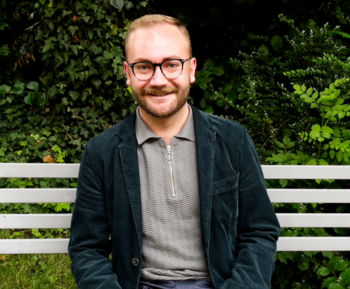 The first prize of 400 EUR in the 2023 edition goes to Felix Bruckner who graduated with an MA in Public History & Kulturvermittlung. In his master’s thesis, titled "Die Grenze im Museum – Narrative einer von Bayern und Böhmen geteilten Grenzregion," he examined six museums located along the Bavarian-Bohemian border, tracing how they deal with concepts and motifs such as (un)naturalness, power and powerlessness, and divisions and connections. These include reflections on the very idea of a border and how this has been constructed historically – such as the Iron Curtain as something unnatural and environmentally – with the green belt offering a more connective narrative framework. In his work, he not only offered insight into museum practices and narratives but also a contribution to the broader field of border studies, applying a comparative and transregional approach tracing the historical dynamics of processes such as de/bordering. His supervisors Prof. Marek Nekula and Prof. Jörg Skribeleit, together with the prize jury, were highly impressed by his in-depth analysis, the quality of the writing, and the breadth of conceptual and methodological approaches, which meant that it offers a genuinely original contribution to several fields.
The first prize of 400 EUR in the 2023 edition goes to Felix Bruckner who graduated with an MA in Public History & Kulturvermittlung. In his master’s thesis, titled "Die Grenze im Museum – Narrative einer von Bayern und Böhmen geteilten Grenzregion," he examined six museums located along the Bavarian-Bohemian border, tracing how they deal with concepts and motifs such as (un)naturalness, power and powerlessness, and divisions and connections. These include reflections on the very idea of a border and how this has been constructed historically – such as the Iron Curtain as something unnatural and environmentally – with the green belt offering a more connective narrative framework. In his work, he not only offered insight into museum practices and narratives but also a contribution to the broader field of border studies, applying a comparative and transregional approach tracing the historical dynamics of processes such as de/bordering. His supervisors Prof. Marek Nekula and Prof. Jörg Skribeleit, together with the prize jury, were highly impressed by his in-depth analysis, the quality of the writing, and the breadth of conceptual and methodological approaches, which meant that it offers a genuinely original contribution to several fields.
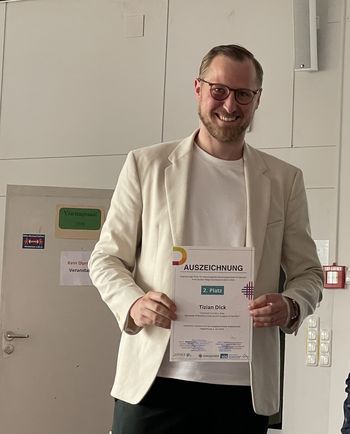 In joint second place were the studies by Tizian Dick and Miriam Mähner. As part of his MA in economics, Tizian Dick wrote the thesis "Optimum Currency Area: Dynamics of Business Cycle Synchronization in the EMU." In his study, he traced the dynamics at work in the European Monetary Union in terms of business cycles over the period from 1990 to 2022, examining to what extent they could be considered synchronized or not, likewise in relation to key crises during that period. His findings have clear policy implications for the ECB and others, as they consider how to shape monetary policy. As his supervisor Prof. Gabriel Lee noted, the empirical part of the study offers new insights into business cycles with a very solid methodology.
In joint second place were the studies by Tizian Dick and Miriam Mähner. As part of his MA in economics, Tizian Dick wrote the thesis "Optimum Currency Area: Dynamics of Business Cycle Synchronization in the EMU." In his study, he traced the dynamics at work in the European Monetary Union in terms of business cycles over the period from 1990 to 2022, examining to what extent they could be considered synchronized or not, likewise in relation to key crises during that period. His findings have clear policy implications for the ECB and others, as they consider how to shape monetary policy. As his supervisor Prof. Gabriel Lee noted, the empirical part of the study offers new insights into business cycles with a very solid methodology.
 Miriam Mähner, who graduated in Ost-West-Studien with a master’s thesis titled "Religionsfrieden als Strategie interkonfessionellen Zusammenlebens in Ost und West. Ein diachroner Vergleich," explored in her study four religious peace settlements stretching from Nantes and Augustburg to Warsaw and Transylvania (Siebenbürgen). Through a critical, comparative analysis she sought to trace the actual historical significance of these peace settlements in the context of the Reformation and what they meant for interconfessional and transnational relations and the potential for violence. She was supervised by Prof. Natali Stegmann and Prof. Julia Herzberg, how at the GWZO in Leipzig, who commented that Miriam has worked through a challenging amount of comparative material, providing fresh insights into the political significance of religious peace settlements, while questioning the typical nation-centred interpretations of these documents.
Miriam Mähner, who graduated in Ost-West-Studien with a master’s thesis titled "Religionsfrieden als Strategie interkonfessionellen Zusammenlebens in Ost und West. Ein diachroner Vergleich," explored in her study four religious peace settlements stretching from Nantes and Augustburg to Warsaw and Transylvania (Siebenbürgen). Through a critical, comparative analysis she sought to trace the actual historical significance of these peace settlements in the context of the Reformation and what they meant for interconfessional and transnational relations and the potential for violence. She was supervised by Prof. Natali Stegmann and Prof. Julia Herzberg, how at the GWZO in Leipzig, who commented that Miriam has worked through a challenging amount of comparative material, providing fresh insights into the political significance of religious peace settlements, while questioning the typical nation-centred interpretations of these documents.
In this third edition of the prize, two equal first prizes were awarded at a prizegiving ceremony held on 20 April 2023 as part of the welcoming of a new cohort of researchers to the Graduate School for East and Southeast European Studies. As Ulf Brunnbauer, director of the Leibniz Institute for East and Southeast European Studies, speaker of the ScienceCampus and former member of the CITAS Board, said “the quality of these two theses is so high that it was impossible to rank them, not least because they are written from different disciplinary perspectives.” The works by Anastasiia Marsheva and Jonas Schmitt, he noted, “both make an important contribution to Area Studies by highlighting the importance of movement and transnational engagement for local practices, thus highlighting how social, cultural and political spaces are created by the interplay of actors on different scales.”
 Anastasiia Marsheva graduated from the Master’s programme in East-West Studies at UR with a thesis on “The Self-Image of Young People from Russia”. In it, she discussed the self-image of young people born in the Russian Federation drawing on interviews with sixteen young people aged between 19 and 30 who either lived in the Russian Federation or had moved to Germany. She demonstrates clearly the relational nature of identity building processes, as well as the modes of inclusion and exclusion that shape it. Doing this kind of research before the background of Russia’s war against Ukraine was certainly particularly challenging, but makes it even more worthwhile, not least because the thesis includes the transcripts of the interviews, providing a very useful source for further research. Her thesis supervisors and reviewers were both highly enthusiastic about her work, with Anne Brüske (DIMAS) stressing her “meticulous discussion of the material” and “impressive discussion of different approaches towards identity formation.” The second reviewer, Ger Duijzings (Social Anthropolgy), attests to the thesis’ “extraordinary quality in terms of sophisticated theoretical framing and the extensive research carried out.”
Anastasiia Marsheva graduated from the Master’s programme in East-West Studies at UR with a thesis on “The Self-Image of Young People from Russia”. In it, she discussed the self-image of young people born in the Russian Federation drawing on interviews with sixteen young people aged between 19 and 30 who either lived in the Russian Federation or had moved to Germany. She demonstrates clearly the relational nature of identity building processes, as well as the modes of inclusion and exclusion that shape it. Doing this kind of research before the background of Russia’s war against Ukraine was certainly particularly challenging, but makes it even more worthwhile, not least because the thesis includes the transcripts of the interviews, providing a very useful source for further research. Her thesis supervisors and reviewers were both highly enthusiastic about her work, with Anne Brüske (DIMAS) stressing her “meticulous discussion of the material” and “impressive discussion of different approaches towards identity formation.” The second reviewer, Ger Duijzings (Social Anthropolgy), attests to the thesis’ “extraordinary quality in terms of sophisticated theoretical framing and the extensive research carried out.”
Jonas Schmitt graduated with a teaching degree in history. His Zulassungsarbeit (State Examination Admission Thesis) was titled “Did Romania’s EU Accession Negotiations (2000-2004) Manifest Core-Periphery Nutrient Pollution in the Danube River? A Qualitative Analysis of the Role of Power to Govern a Common.” As Ulf Brunnbauer noted, the title might not be the catchiest but behind it there was a fascinating piece of original research drawing on legislation, reports and expert interviews to analyse the interplay between EU accession policies and environmental protection in relation to the Danube. The work’s first reviewer, Rainer Liedtke (European History), rightly concluded that this is an “excellent piece of research” showing that in the field of transnational environmental protection, the EU framework strengthened “democratic processes, rule compliance, and capacity building”. His work is thus a powerful repudiation of those assessments which see the new member states only as a periphery dominated by Germany. Still, even with an equal seat at the EU table, Romania and other countries downstream must often bear the brunt of pollution, for which they have no responsibility at all.
The first prize of 400 EUR in the second edition of the prize goes to Thomas Meyer for his master’s thesis “'Eine SMS und weg war ich!‘: Migrationsnetzwerke unter rumänischen Bauarbeitern in der Oberpfalz” ("‘One SMS and I was off!’ Romanian construction workers’ migration networks in Upper Palatinate"). Thomas Meyer used his summer job at a construction site, where he became acquainted with the Romanian migrants at the centre of his study, to explore informal migration networks. His study finds that many workers rarely had a clear plan to come to Germany but rather took decisions “on impulse” having learned about jobs from relatives. Submitted as part of his master’s degree at UR in East-West Studies, Meyer’s thesis applies an ethnographic approach to offer insights into the lives of migrants. He was supervised by Ger Duijzings (social anthropology) and Heike Karge (Southeast European studies).
Two equal second prizes of 200 EUR went to the Romance studies graduate Marie-Christine Scholz for her final paper “'Cette chère zone grise…‘. Die Fernsehserie Un Village français im Kontext aktueller französischer Erinnerungskultur” ("‘Cette chère zone grise…‘: The television series Un Village français in the context of contemporary French memory culture") and the East-West Studies graduate Magdolna Molnár for her study “‘Here you must live, and die?’ Why young Hungarians leave their country: A case study of intra-EU youth mobility from Hungary to Germany”.
The prizes were formally awarded on 25 April 2022 as part of the opening of the joint CITAS and ScienceCampus lecture series, Frictions and Transformations of Globalization.
Jana Stöxen, a graduate of the East-West Studies MA programme, received first prize and 400 EUR prize money in recognition of her master’s thesis: “Transformation im Treppenhaus? Soziales Gefüge im semi-öffentlichen Raum eines Bukarester Plattenbaus zwischen materiellem und ideellem Erbe des rumänischen Sozialismus“ (Transformation in the Stairwell? Social practices in the semi-public space of a Bucharest high-rise estate. Between the Stoexenmaterial and ideal legacy of Romanian socialism).
In her case study she explored life in the estate in the Bereceni district of the Romanian capital to explore the extent to which socialism and its ideals of solidarity had survived into the post-communist period. She spent two months living in the estate, conducting interviews with the inhabitants, as well as with experts and architects. She offered a clear image of the transformations that had affected the building and its inhabitants who had adapted to new conditions, even as a trend to individualism and alienation became evident. She was supervised by Ger Duijzings (Social anthropology) and Günther Hirschfelder (Comparative cultural studies).
Two equal prizes of 200 EUR went to the Romance studies scholar Daniela Weinbach for her study „Kulturübergreifend erfolgreich? Ein interkultureller Filmvergleich zwischen dem deutschen Premake Fack ju Göhte und dem mexikanischen Remake No manches Frida“ (Cross-culturally successful? An intercultural comparative film study of the German premake Fack ju Göhte and the Mexican remake No manches Frida) and the graduate of the elite MA programme in East European Studies Melanie Hussinger for her Master’s study “Ein Name, ein Leben, ein Zeichen. Historisches Gedenken im zivilgesellschaftlichen Projekt Poslednij Adres“ (One Name, One Life, One Symbol. Historical memory in the civil society project Poslednij Adres). Hussinger explored the role of cultural memory in remembering the victims of Stalinism in Russia. Weinbach is currently a PhD student at the Leibniz ScienceCampus in Regensburg.
Due to the COVID-19 pandemic, the prize was awarded online during the CITAS and ScienceCampus lecture series.
